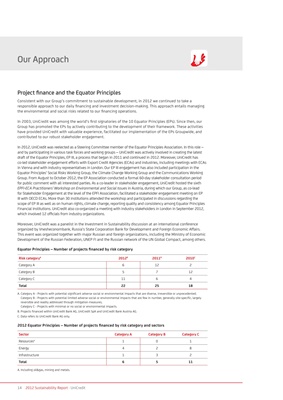
Our Approach
Project finance and the Equator Principles
Consistent with our Group’s commitment to sustainable development, in 2012 we continued to take a
responsible approach to our daily financing and investment decision-making. This approach entails managing
the environmental and social risks related to our financing operations.
In 2003, UniCredit was among the world’s first signatories of the 10 Equator Principles (EPs). Since then, our
Group has promoted the EPs by actively contributing to the development of their framework. These activities
have provided UniCredit with valuable experience, facilitated our implementation of the EPs Groupwide, and
contributed to our robust stakeholder engagement.
In 2012, UniCredit was reelected as a Steering Committee member of the Equator Principles Association. In this role –
and by participating in various task forces and working groups – UniCredit was actively involved in creating the latest
draft of the Equator Principles, EP III, a process that began in 2011 and continued in 2012. Moreover, UniCredit has
co-led stakeholder engagement efforts with Export Credit Agencies (ECAs) and industries, including meetings with ECAs
in Vienna and with industry representatives in London. Our EP III engagement has also included participation in the
Equator Principles’ Social Risks Working Group, the Climate Change Working Group and the Communications Working
Group. From August to October 2012, the EP Association conducted a formal 60-day stakeholder consultation period
for public comment with all interested parties. As a co-leader in stakeholder engagement, UniCredit hosted the sixth
EPFI-ECA Practitioners’ Workshop on Environmental and Social Issues in Austria, during which our Group, as co-lead
for Stakeholder Engagement at the level of the EPFI Association, facilitated a stakeholder engagement meeting on EP
III with OECD ECAs. More than 30 institutions attended the workshop and participated in discussions regarding the
scope of EP III as well as on human rights, climate change, reporting quality and consistency among Equator Principles
Financial Institutions. UniCredit also co-organized a meeting with industry stakeholders in London in September 2012,
which involved 12 officials from industry organizations.
Moreover, UniCredit was a panelist in the Investment in Sustainability discussion at an international conference
organized by Vnesheconombank, Russia’s State Corporation Bank for Development and Foreign Economic Affairs.
This event was organized together with major Russian and foreign organizations, including the Ministry of Economic
Development of the Russian Federation, UNEP FI and the Russian network of the UN Global Compact, among others.
Equator Principles – Number of projects financed by risk category
Risk categoryA 2012B 2011B 2010C
Category A 6 12 2
Category B 5 7 12
Category C 11 6 4
Total 22 25 18
A. Category A - Projects with potential significant adverse social or environmental impacts that are diverse, irreversible or unprecedented;
Category B - Projects with potential limited adverse social or environmental impacts that are few in number, generally site-specific, largely
reversible and readily addressed through mitigation measures;
Category C - Projects with minimal or no social or environmental impacts.
B. Projects financed within UniCredit Bank AG, UniCredit SpA and UniCredit Bank Austria AG.
C. Data refers to UniCredit Bank AG only.
2012 Equator Principles – Number of projects financed by risk category and sectors
Sector Category A Category B Category C
Resources A
1 0 1
Energy 4 2 8
Infrastructure 1 3 2
Total 6 5 11
A. Including oil&gas, mining and metals.
14 2012 Sustainability Report · UniCredit